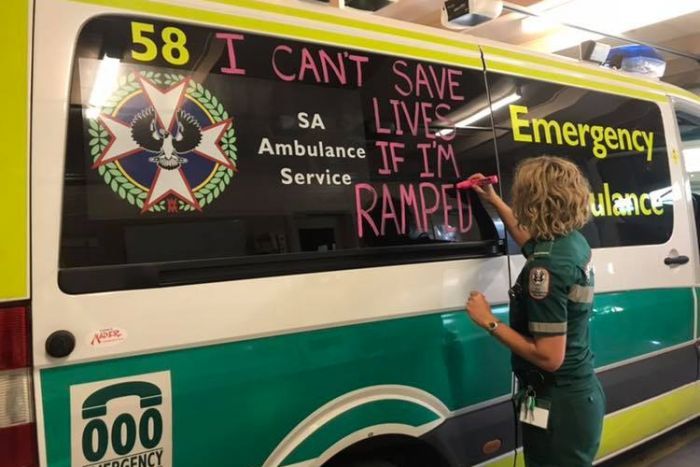“Ramping” - a Third World problem in a First World setting
Written by: on
In Australia we seem to have First World ambulance services and hospital facilities, yet Third World conditions where the two meet.
Yesterday, an old lady in her nineties developed bed sores as a result of being “ramped” for eight hours.
There was nothing wrong with the ambulance that transported her to Adelaide’s Flinders Medical Centre and nothing wrong with the facilities inside, had she been able to access them when she arrived.
It is not uncommon for ambulances to be “ramped” – parked at the Emergency Department entrance of a public hospital but unable to deliver their patient into hospital care – for 3 to 4 hours.
Up to 20 ambulances at a time can be ramped at each of the two major public hospitals in this state – Flinders and the new Royal Adelaide Hospital (RAH).
Ambulance crews and patients are placed in a situation where they are exposed to the serious health risk of a buildup of diesel fumes from the ambulance engines.
Phil Palmer, State Secretary of the Ambulance Employees’ Association (AEA), told ABC radio recently that ambulance crews being ramped often had to work past their rostered daily shift, and that whilst they were paid overtime, they were being kept from attending to others requiring ambulance services, as well as from their families.
He said, under figures provided by the employer, SA Ambulance Services, $660,000 was being spent on paramedic overtime payments every fortnight.
Other ambulance officers were “on call” to make up shortfalls – called in on their days off to fill the gaps in services that occurred when crews were being ramped.
Ramping is an ongoing problem and was not addressed by the previous state Labor government. Nor is it being addressed by the current state Liberal government. There have been numerous times over the last few years when ramping has resulted in most of the metropolitan area and large parts of the whole State being without emergency ambulance cover.
The AEA recently launched legal proceedings against government department SA Health and the employer, SAAS, over the overtime crisis. Pretending to be fair-minded in the public spotlight, SA Health Minister Stephen Wade said the union was entitled to stand up for its members in whatever forum it wanted to.
But less than 10 days later, the AEA state President was denied entry to a summit of “ramping stakeholders”.
This is typical of the anti-union stance of the Liberals, who are trying everywhere to de-unionise the State: taking union reps off statutory boards, removing teacher union reps from merit selection and school review panels, and not consulting unions like the AEA over significant crises like ramping.
More ambulances and paramedics are urgently required. More beds in expanded Emergency Departments are required. Significant investment in primary/preventative health care is required. It was recommended to the previous Government many years ago (The “Generational Health” Review), but they chose not to invest. So here we are.
Capitalism is not working when measures are not taken to address a Third World problem like ramping. Neither of the major capitalist parties, Liberal or Labor, has done, or is doing, anything to alleviate the crisis.
If the legal action undertaken by the AEA fails to resolve matters, AEA members will have to creatively develop those forms of industrial action which, without compromising their professional obligations, leave them free to create some old-fashioned mischief.
They are assured of widespread community support.
Print Version - new window Email article
-----
Go back
Independence from Imperialism
People's Rights & Liberties
Community and Environment
Marxism Today
International
Articles
| No Pride in an Ongoing Genocide |
| Adelaide Writers’ Week near collapse as authors stand with Dr Randa Abdel-Fattah |
| When we fight back, let’s stand on solid ground |
| Don’t let responses to Bondi silence our voices! |
| Dangers in multinational corporations’ drive to establish Space-based data centres |
| Criminalising Lenin - Putin’s attempts to stifle dissent |
| Wage-theft: an Australian standard business practice |
| The Whitlam Dismissal: America's coup for the control of Australia |
| Party booklet on Whitlam dismissal released |
| CPA (M-L) paper on fascism in Australia |
| Let the ruling classes tremble at the sight of the fighting Filipino masses |
| Labor law used to intimidate and harass opponents of genocide |
| Book Review: The New Age of Sexism |
| Violent Nazi attack on Camp Sovereignty should be investigated as a hate crime |
| Let Palestinians decide! |
| We stand with Mary! |
| Israel illegally boards Freedom Flotilla Boat: Albanese must protect Australians involved |
| New Freedom Flotilla heads for Gaza as massacres increase. |
| Terrorism? Where do we stand? |
| Solidarity with the courageous resistance against mass deportations and the establishment of a fascist dictatorship in the USA |
-----

